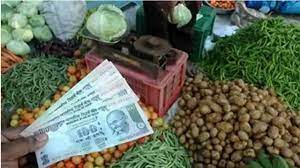India’s WPI inflation eases to 24-month low of 4.73% in January

India’s wholesale price index: According to preliminary figures from the Commerce Ministry, India’s wholesale pricing index (WPI)-based inflation decreased from 4.95 percent in December to 4.73 percent in January. The month-on-month change in WPI index for January witnessed an increase of 0.13 per cent as against a contraction of 1.12 per cent in the preceding month.
February 2023 Current Affairs Quiz
The WPI is one of the two indices that measure inflation in India. The other is Consumer Price Inflation (CPI). The WPI captures prices at the level of production or manufacturing, taking into account goods traded between companies, as against the CPI that measures prices at the retail consumer level. Food items, which constitute a major part of the CPI, drive retail inflation, while for the WPI, it’s manufactured goods.
Key points
- Inflation in food articles, however, rose to 2.38 per cent in January, from (-) 1.25 per cent in December 2022. In fuel and power, the inflation was 15.15 per cent during January 2023. Inflation in manufactured products was 2.99 per cent during the month, according to the latest data from the commerce and industry ministry.
- Inflation in pulses was 2.41 per cent, while in vegetables was (-) 26.48 per cent. Inflation in oil seeds was (-) 4.22 per cent in January, 2023. Fuel and power basket inflation eased to 15.15 per cent, from 18.09 per cent in December 2022. In Manufactured products it was 2.99 per cent, against 3.37 per cent in December, 2022.
- However, in contrast to this, according to the latest CPI data released on Monday, the country’s retail inflation jumped to a three-month high of 6.52 per cent in January 2023, mainly due to costlier food and fuel. The inflation rate measured by the Consumer Price Index (CPI) had decreased to 5.72 percent in December 2022. In November 2022, it had fallen to 5.88 per cent. The retail inflation came under the RBI’s 2-6 per cent band in November with 5.88 per cent rate after remaining beyond it for 10 months consecutively.